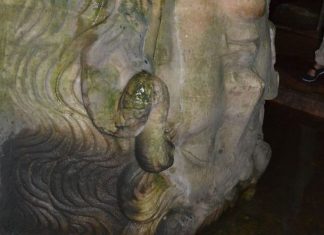St. Emperor Justinian:
DIALOGUE WITH PAUL OF NISIBIS
Translated by Dr. Jeffrey Macdonald, 1998.
Extract of the Discussion which the Emperor Justinian had with Paul the Bishop of Nisibis, who was a Nestorian.
Cæsar: Do you confess with us that God the Word, who has the same nature as the Father, is incarnate and has become man from the womb of the Virgin Mary and that He has taken a body which has the same nature as us and has made himself an indivisible unity, and that there is not another man, who would exist in a separate hypostasis, or be known apart from Himself, do you confess [this] or not?
Nestorian: We confess, as we have taken from the Prophets and the Apostles, that the one who has taken the form and likeness of God has taken the form of a servant from the womb of the Virgin and is conjoined in an indivisible unity.
Orthodox: Thus I say, this is His own body, as for each of us there is a proper body.
Nestorian: Then Christ is not a particular man in His human nature, but is only God, because He does not subsist as a complete and hypostatic man in a natural unity.
Orthodox: Christ is perfect man in His human nature, as He is truly also perfect God because He is one hypostasis which possesses two perfections. But if there are two hypostases as you suppose, and not one, He is not able to be called one so as to possess two complete things, but each hypostasis being complete in itself, there would be no intermediary to unite the completed things. For that which is completed in two hypostases is a nature, but if in two natures then it is a hypostasis.
Nestorian: Christ subsists in His Divine nature. Do you call it a perfect subsistence or something else?
Orthodox: Christ subsists in His Divine nature, and in it He is perfect God as is the Father and the Holy Spirit, existing forever in one Divine nature.
Nestorian: Since Christ also subsists in His human nature, do you call Him a perfect man, yes or no?
Orthodox: We say that the human nature subsists in the hypostasis of the Word of God, since it is not seen and known properly in its own particular hypostasis, but it possesses existence in the hypostasis of the Word.
Nestorian: If Christ possesses subsistence in His Divine nature, and subsistence in His human nature, then a subsistence plus a subsistence makes two subsistences. Therefore Christ has two hypostases and two natures.
Orthodox: Christ does not have two hypostases as He has two natures, because His humanity is not numbered and counted with Him as having its own particular hypostasis, in that it is truly His own and not that of another man. Christ Himself holds in His hypostasis the two existent natures of His divinity and His humanity. There are not two subsistences which are themselves counted of themselves, as if there were here understood two hypostases. But we know one hypostasis of God the Word, which contains in itself the two existent natures of His Divinity and His humanity. However, by no means does each existence express a hypostasis. For the natural property only expresses the nature, and this property is seen in every hypostasis equally. There is not one of the hypostases, from those which show the same species, which does not have this property or essence in it; nor do some have it more and some have it less, but it is in each of them equally as we have said. But the property which makes known the hypostasis is distinguished by singleness and peculiarity which is from it and to it. This property is not seen in all the hypostases equally, but only in one of the hypostases which are in a nature.
Read More about Paul of Nisibis is further suggested






